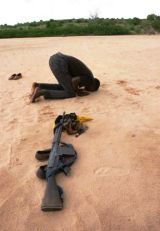Nobody danced. No drums. Just fear. Some holiday!
By MARC LACEY, The New York Times
ABU SROUG, Sudan, April 21, 2005 — On the Prophet Muhammad’s birthday, the besieged people in this hardscrabble village in Sudan’s war-ravaged Darfur region on Thursday skipped their usual all-night vigil at the mosque.

|
|
A rebel of SLA prays on the sand. (Reuters). |
There was also no butchering of a cow this morning, and therefore no feast to honor the prophet’s entrance into the world. No drumming filled the air. Nobody danced. It was far too dangerous for all that.
So on what was supposed to be a joyous day, the men and women here did what they now do every day. They sat in the shade and mulled their grim fate.
They did pull out their Korans for a while, but they held no mass gatherings and did not make much noise. A true celebration would have attracted too much attention from the armed militias that still control the Darfur countryside, they said.
“Now people are afraid to come together for ceremonies,” said Haroun Adam Abdallah, a teacher at the primary school in Abu Sroug, a village that has grown from 5,000 people to triple that number as the armed militias known as the janjaweed empty out other settlements in the area. “It’s too dangerous.”
He added that even if a celebration were possible, they could not afford the cow.
As it was, some of the militiamen who have wreaked so much havoc in Darfur arrived in Abu Sroug this morning. There were 30 of them, looking as menacing as usual, mounted on their horses and camels and wearing their head wraps.
The armed men said they were searching for lost camels, but the villagers thought that was a ruse. The surprise visit was timed perfectly. On a typical holiday there would have been a feast in full swing. There would have been men and women dancing to the beat of the village drummers. The militiamen, the villagers said, were making sure that nobody was enjoying this holiday.
They needn’t have bothered.
“This day is supposed to be a day of celebration but it’s the opposite,” said Mr. Abdallah, a father of four who teaches Arabic and math. “We’re living in fear.”
So much in Darfur has been destroyed over the last two years of war. Lives have ended abruptly – as many as 400,000, according to a study released today by the Washington-based Coalition for International Justice. Villages have been torched. Belongings have been looted and destroyed.
Something else has been damaged in Darfur, as well: the very culture of the place.
Weddings are rare now because people are too afraid to think about such things and nobody has any dowry. The victimized tribes here have lost their herds of livestock to the marauding militias.
When there is a marriage, it is quick and simple. “You just have a meal and that’s it,” Mr. Abdallah said.
Burials do occur. Many. Outside Abu Sroug, the cemetery is growing rapidly. In the countryside, there are makeshift graves. But even laying people to rest is not done as it was in the old, more peaceful days.
When Bushra Ismail’s brother Ibrahim was killed, she did not spend 40 days mourning, as custom dictates. Soon after Ibrahim’s burial, his sister was out of the mourning hut where she was supposed to stay sequestered. She is a health worker at the local hospital and with all the sick and injured people in Darfur these days, she could not stay away so long.
Nobody mourns that long anymore. Another attack might occur. It is more important, people say, to keep watch.
The last militia attack took place on April 18 when a group of men walked to a nearby market in search of some white cloth to wrap up the body of a young boy who had just succumbed to sickness.
On the way back to the village to bury the boy, the men encountered some members of the janjaweed, who beat them to show who controlled the countryside.
“They hit me here,” said one victim, lifting his turban and showing a welt on the side of his head.
The wounded men hurried home and the burial took place fast.
At least that young boy was buried. Many bodies are abandoned altogether these days. In other instances, when the militias leave many corpses all at once and then ride off, the villagers quickly dig one hole and put the victims in together.
Hassan Muhammad Adan, 31, went out into the countryside to point out one such site.
“It is just beyond that dried riverbank,” he said. But once there, he pointed to some trees in the distance and said it was there. At the trees, the spot was still farther.
He eventually found it, beside an abandoned village. There were some rocks in the sand and some thorn branches piled atop them. Mr. Adan had buried some of his neighbors in this site after an attack last fall. He remembers the date, Oct. 15, because the fasting period of Ramadan had just begun when the militia swooped in.
Twenty-five people were killed. Mr. Adan and others quickly dug graves. He remembers putting five bodies in one grave and another four corpses into another. There was no time to wrap the bodies. They were buried in their clothes.
“We dug in a hurry,” he recalled. “We mourned them, but we did that in a hurry too.”
